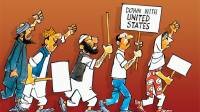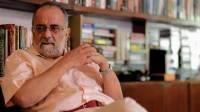In the bustling streets of Pakistan, burning effigies of American presidents, hoisted by angry mobs chanting anti-US slogans are a familiar spectacle. In March 2013, the Huffington Post published an article, ‘10 countries in the world that hate America the most’, and Pakistan ranked number one, with 79 percent of respondents disapproving of the US leadership.
Many Americans question why, despite the millions of dollars the US gives Pakistan in the form of aid, along with Pakistan’s state level alliance, public sentiment remains hostile. Fury at the United States can be a uniting element between otherwise opposing groups, but some Pakistanis see more to the US than just its controversial foreign policy: US graduates in Pakistan.
Acquiring an American degree is not easy for most Pakistanis due to financial constraints. However, increasing numbers of government-sponsored scholarships, and the US State Department-funded Fulbright programme, are making a US degree accessible to many with the coveted GPA and GRE scores, but not the finances to make it to universities abroad.
Having lived in the United States for some time before their return, these people get a chance to look at Pakistan from an outsider’s perspective. Azam Noon, who returned from Pennsylvania State University after a two-year stay, said the anti-US sentiment that exists in Pakistan has its roots in politics and culture.
“Many Pakistanis have a strong dislike for America because their women can work and procreate at will, and homosexuals are allowed to own up to their orientation and mingle freely,” said Noon, 28, who now works as a maths curriculum manager in Lahore. Noon said that when America attacks countries under the guise of overthrowing tyrannical dictatorships, it garners a legitimate anti-US sentiment. In fact, he says, many Americans themselves resent their own government for this. Despite this apparent hatred, many Pakistanis dream about settling and vacationing in the US. He described it as “a strange love-hate relationship.”
“People who have lived in the US know how liberating it can be,” he said. “Those with superficial, vicarious information will judge.”In order to rationalise his liking of the United States, Noon said he would have to completely separate the actions of the American government from its people and places. “For me, a love for America can coexist with a love for Pakistan,” he said. “But I wonder if for other people it is an either/or situation.”Noon’s skepticism is found in many circles where patriotism for Pakistan is best defined by a hatred for the US.
Many popular activists in Pakistan who have campaigned for rape victims internationally have at times been labeled as US agents. Journalists who have not demonstrated a sufficiently anti-American stance have been deemed American spies. Terrorist attacks in Pakistan frequently give rise to conspiracy theories that allude to US involvement.
Noon said he loved the work ethic in America. “If one delivery window was promised, that’s when things came. No one broke queues,” he said. “People sat in mixed company without any awkwardness or jumping to conclusions. People worked hard, partied hard and were very helpful.”
As for the disapproval of America in many circles, Noon contends that the US became even more unpopular in Pakistan after the secret CIA operation to hunt down Osama Bin Laden. ‘‘The Pakistani intelligence and government were not involved in the raid, they merely acquiesced to it,” he claimed. “The world’s most powerful country pressurised them, and they buckled.
However, Shamsher Ali Khan, 30, awarded the Fulbright scholarship in 2011 for his MBA at Tulane, thinks otherwise.“I don’t think American popularity has been affected as a result of the Osama incident. I believe it is our own government that has borne the brunt of the negative fallout following the US raid on Osama,” he said.
Khan said he feels that this incident was the first time Pakistani civil society started to question the government’s efforts towards security issues. “It is our faith in our own government that has suffered a hit, rather than America’s approval ratings,” he remarked.
After his return this year, Khan joined a telecom company, and says he possesses a greater understanding of American culture. “After my stay in the US, the interaction helped me realise that Americans are quite open, accommodating and adaptable to foreigners; are great advocates of moral values; highly approachable and cooperative. That is something I could not have well perceived prior to my visit,” he said.
Khan said he felt that educated members of society tend to hold more balanced opinions, and avoid putting all the blame for their everyday miseries on American shoulders due to a better understanding.
“The uneducated section of society – which forms a vast majority of Pakistan’s total population – holds a negative sentiment against America,” he remarked. “This basically stems from a lack of understanding of matters, at both the regional and global level.”
“I consider drone strikes to be extremely detrimental to Pakistan’s stability. The only thing drone attacks do is forward the agenda of the terrorists. But this is something on the political or military front, and Pakistanis should refrain from using it as a means to judge American society as a whole,” he lamented.
Taiba Zia, a recent graduate of Columbia University, lived in New York for two years before returning to Pakistan. She remarked that drone strikes, which may have been tacitly approved by the Pakistani government despite its overt denials, are “a source of deep resentment towards the US government, as they frequently take innocent lives.”
“I have my reservations about the effectiveness of drone attacks, and cannot in good conscience support [them], because of their significant civilian death toll,” she said.
Even though she has issues with US foreign policy, she perceives the society to be enriching and vibrant. “Many people can separate American foreign policy from what is good about the country. I have good memories of living in the US, as I liked the anonymity, the way I could just blend in from the moment I landed,” she said. For her, things which she considered privileges in Pakistan became her way of life in the United States, and she felt an unprecedented sense of freedom.
‘‘Living there made me feel safe, free to do whatever I wanted, go wherever I wanted to go and be whoever I wanted to be, without fear of overt judgment,” she said.






















